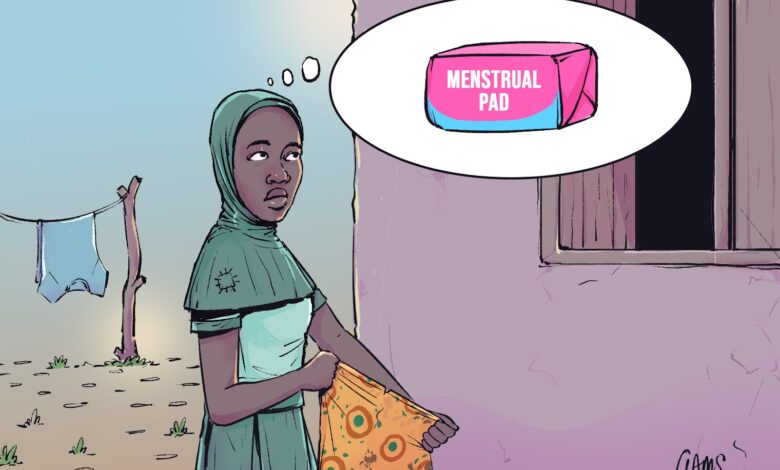Rags For Menstruation: The Harsh Reality Of Period Poverty In North East Nigeria
The rising cost of period products has been a long-standing issue for women and adolescent girls across Nigeria. In Adamawa, menstrual hygiene is far from many young girls and it's affecting their academics.

Eunice Elisha is one of many young girls experiencing hardship as a result of period poverty in Adamawa State, North East Nigeria.
“The effect is not just physical, it is emotional and even mental,” said the 16-year-old.
Like many women, she started menstruating at the early stage of her teens.
But Eunice neither has access to sanitary pads nor menstrual education and hygiene facilities.
Her parents would rather use their little earnings to cater for food so that the family can survive.
She uses old rags and large leaves in extreme cases to hold blood during her monthly periods.
When her period arrives during school hours, she uses her tissue paper or her notebooks.
“I tear my notebooks or use tissue paper sometimes,” she told HumAngle while expressing the discomfort that comes with her menstruation.
“Prior to starting my period, I was eager to welcome it, because I was told if I don’t do it, I won’t be able to give birth. But it’s quite unfortunate that it comes with so much negative baggage.
“The fear of staining my school uniform and the lack of hygiene facilities make me stay at home to take care of myself throughout my menstrual period and I feel very unhappy whenever I miss school.”
According to the University of Oxford’s sanitary pad accessibility and sustainability study, sanitary products such as pads promise privacy for a girl as it keeps the world from knowing when she washes, changes, dries or disposes of whatever menstrual method she uses.
Burden?
The average woman menstruates from age 13 until age 51, about once a month with each of the periods lasting from three to seven days.
The prices of sanitary pads in Nigeria have moved from ₦350-₦400 in 2019 to ₦700-₦950 in 2021.
With almost 83 million Nigerians living below the poverty line, parents would rather use their money for food and sustenance, rather than sanitary products for their children.
Meanwhile the use of cloth strips or foams could cause health issues that include urinary tract infections caused by poor hygiene.
Many Nigerians in Oct. 2018 protested on X (formerly Twitter) as they urged the federal government to scrap the tax on sanitary pads to make them affordable for women and young girls.
A challenge for many
In 2021, ex-minister of women affairs, Dame Pauline Tallen said over 37 million Nigerian women of menstruating age do not have access to sanitary pads due to financial constraints.
Yet, nothing significant has been done by the government to improve this. Instead, inflation continues to cause hardship on citizens.
In low-income communities like Jambutu in Adamawa, many individuals like Eunice struggle to afford sanitary products such as pads, tampons, or menstrual cups.
Also, limited access to clean water, sanitation facilities, and health services exacerbate the challenges faced by those experiencing period poverty.
Many times, young girls sacrifice their education to find alternative solutions to menstrual hygiene management.
Hope Zira shares a similar story of using old rags during menstruation due to the financial constraints that make it difficult for her to afford pads.
“Since I started menstruating, I always pray it doesn’t come again. I feel helpless and scared to approach anyone about this challenge. I tried my best to come up with better solutions to this plight, but to no avail.”
Hope explained that skipping classes as a result of menstruation negatively impacts her academic performance and self-esteem.
“The unfairness of period poverty prevents me from experiencing equal opportunities and hinders my progress in class.”
Filling the gap
In a bid to assist young girls, Maureen Danladi, a girl-child rights advocate is trying to help end period poverty in the Jambutu community.
She said she has contacted various non-governmental organisations that promised to give the young girls monthly menstrual hygiene kits and educate them on menstrual hygiene management.
According to her, this local NGO promised to also liaise with other international NGOs here in Adamawa State, to see how they can partner and provide WASH facilities in schools within the community.
“I met with some of the girls in Jambutu who struggled with period poverty. I understand that the lack of knowledge and understanding surrounding important topics such as menstrual hygiene, sexually transmitted infections, personal hygiene, and gender-based violence of I started a group discussion among them.”
The teenagers shared their thoughts, concerns, and experiences with her as she provided them with valuable information that allowed the young individuals to find solutions among themselves.
“Lack of open dialogue of menstruation leads girls to early pregnancy and uninformed decisions. Recognising the importance of accurate information helps make informed decisions about their sexual and reproductive health. It also instilled a sense of confidence and self-worth within them.”
Milcah Gaman is a HumAngle Accountability Fellow from Adamawa State. This Article is part of the project; ‘Promoting Transparency in Insurgency-Related Funding in Northeast Nigeria’ in partnership with the MacArthur Foundation.
Summary not available.
Support Our Journalism
There are millions of ordinary people affected by conflict in Africa whose stories are missing in the mainstream media. HumAngle is determined to tell those challenging and under-reported stories, hoping that the people impacted by these conflicts will find the safety and security they deserve.
To ensure that we continue to provide public service coverage, we have a small favour to ask you. We want you to be part of our journalistic endeavour by contributing a token to us.
Your donation will further promote a robust, free, and independent media.
Donate HereStay Closer To The Stories That Matter




